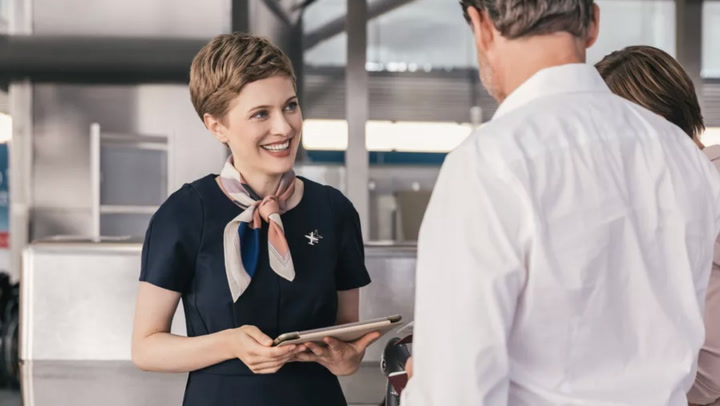1. Introduction
They notice a lot about you in that first greeting — and here’s why it matters.
2. Observations of Flight Crew
When boarding a plane, have you ever wondered what the flight crew is thinking as you say hello to them? Turns out, they might be sizing you up.
“When boarding the aircraft, Turkish Airlines flight attendants are happy to smile and greet you with the welcoming Turkish hospitality that they are known for, but they are also analyzing a number of important factors that could contribute to the in-flight experience,” cabin chief Duygu Eren Tosya of Turkish Airlines shared with iBestTravel via email. “They are identifying passengers who may be able to help assist in an emergency, as well as passengers who may need additional help in an emergency situation, such as an elderly or injured person.”
According to Tosya, crew members are also looking to identify passengers who may be nervous fliers and may need words of encouragement.
“Overall, the No. 1 thing running through their mind at all times is how to keep each and every passenger safe from the moment they step onto the plane until they deboard,” Tosya said. “The world-class hospitality and friendly interactions with passengers are an added bonus to the job.”
3. What Crew Members Notice
What else do crew members notice? Here’s what a few more crew members shared on Quora when asked, “What do flight attendants notice about passengers as they board the plane?”
3.1 Identifying New or Nervous Flyers
Whether you’re a new or nervous flier.
Flight attendant Kimberly Sullivan said she always keeps an eye out for first-time passengers.
“We can detect if they are experienced customers by the way they board the plane,” Sullivan shared. “If they are holding up the aisle and have tunnel vision, we know they are rookie travelers.”
3.2 Assisting in Emergencies
Your ability to act in an emergency.
Janice Bridger, a flight attendant with 27 years of flying experience, shared several things she looks out for, but she mainly looks for people who may need assistance in an emergency.
“I watch for disabilities that may disqualify someone from sitting in the exit row. They need to be able to physically lift a heavy hatch (up to 60 lbs) or open a heavy door (several hundred pounds),” Bridger said. “Likewise, if they cannot understand English, they cannot understand shouted commands. Nor can they read the instructions on how to open the exits.”
3.3 Recognizing Intoxicated Passengers
If you’re intoxicated or ill.
Nuralia Mazlan, who listed themself as a flight attendant for Air Asia, said they always look out for intoxicated passengers.
“Because more often than not, this is the type of people that are more likely to create troubles on board,” Mazlan shared. Once the aircraft door closes and we start to push back, this is high time for this person to start…whatever.” And in case you needed an example, Mazlan shared that a 20-year-old male passenger once stripped naked while the plane climbed to 10,000 feet.
3.4 Assessing Physical Capability
Whether you have the ability to lift heavy items.
Bridger noted that she often looks for someone who seems fit, just in case she needs the extra muscle.
“If I see someone who is muscular, powerful, strong, physically fit, I memorize his/her face and make a mental note of where they are sitting,” Bridger wrote. “I consider this person a resource for me. In the event of an attack on the flight or on me, these are my ‘go-to’ people. If a situation looks like it could develop, I’ll privately and discreetly ask one of these people if they would be willing to help us if necessary. Help might involve subduing or restraining an unruly passenger. We hope it never happens, but we will prepare just in case it does.”
3.5 Identifying Airline Employees
If you’re a current or former airline crew member.
“I try to learn if we have any passengers who are airline employees, particularly crew members who have been trained in the in-flight procedures,” Bridger added. “These people also are a resource for me. They’ve been trained in what to do in an emergency, whether medical, mechanical, etc. They know how to handle the situations as well as I, and are trained to become an instant ‘team member,’ fitting right in immediately if needed. They are an invaluable resource for me, and I like to know who they are and where they’re sitting.”
For example, Bridger pointed to the 1989 United Flight 232, which suffered catastrophic failure while in the air, resulting in a crash landing in Sioux City, Iowa. On the flight, crew members identified Dennis Fitch, another United Airlines captain and DC-10 flight instructor, who happened to be aboard as a passenger. Fitch assisted the flight’s captain by taking over the controls of the throttles until the plane hit the ground. His actions are credited with helping save the lives of the 184 surviving passengers.




